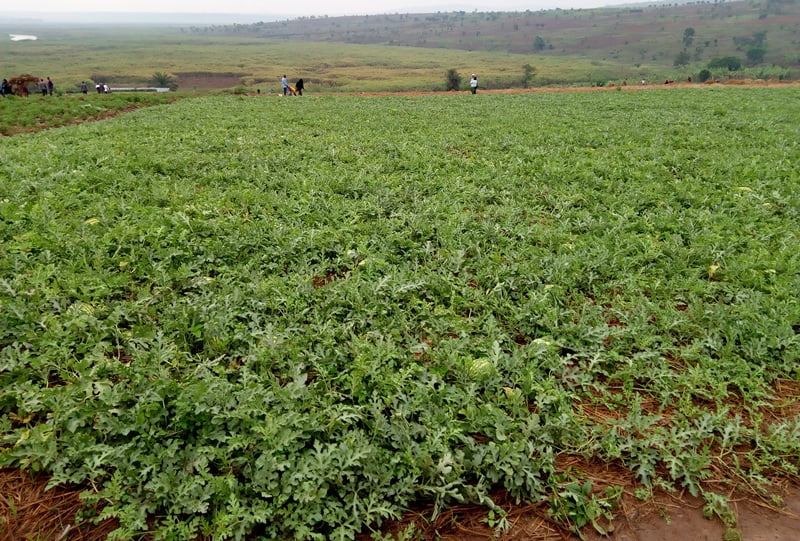Beneficiaries of Hinga Weze are praising the outcomes from the project

Watermelon is one of the crops grown by Hinga Weze beneficiaries
Hinga Weze, a USAID-funded project that aims to sustainably increase smallholder farmers’ income improved the nutritional status of women and children.
In an inclusive interview The Bridge, one of the beneficiaries of Hinga Weze, Mukakarera Odette, expressed a sense of satisfaction from what she gained from the project.
They used not to use good farming practices like planting in rows for crops like beans and maize. Sometimes they were not aware how to prepare vegetables picked from their gardens for proper cooking. After being coached by Hinga Weze, they have learned better practices right from the first stage of preparing seedlings up to harvest and post-harvest time.
Odette who is a resident of Rurambi cell, Nyarugenge Sector, Bugesera District, explains how the project helped farmers to access market and development.
“Hinga Weze trained us how to use our small land. Previously we used traditional and rudimentary way of farming method where we mixed different crops in one garden. We could mix beans with maize, cassava sweet potatoes. We didn’t know about vegetable farming. Later Hinga Weze helped us to improve and develop our farming practices.” She said
Support to farmers in Bugesera promotes nutrition sensitive agriculture
She added: “Hinga Weze supports us in various farming sectors; they gave us selected high yield seed varieties for maize and high iron beans. They taught us how to add organic soil fertilizer unlike those days when we used to manure poorly. We have since improved our harvest.”
Records show that malnutrition in Rurama Cell used to be high where among 13 children 5 would be found in red and 8 in yellow.
“After Hinga Weze training to strengthen the link between agricultural and nutrition to improve the nutritional status of the community and families, our children are now leading a good healthy lives.”
Mukakarera Odette also appreciates the training they received from Hinga Weze on financial literacy and access to market. Other lessons were on sustainable agricultural productivity where they were coached on resilience of farming systems by improving water management and water harvesting and preventing soil erosion, and maximizing the effectiveness. Hinga Weze also helped the community to access post-harvest equipment and facilities, market information, credit and financial services and improve nutritional outcome.
The Feed the Future Rwanda Hinga Weze Activity is a five-year USAID-funded project (2017-2022) that aims to sustainably increase smallholder farmers’ income, improve the nutritional status of women and children, and increase the resilience of Rwanda’s agricultural and food systems to a changing climate.

